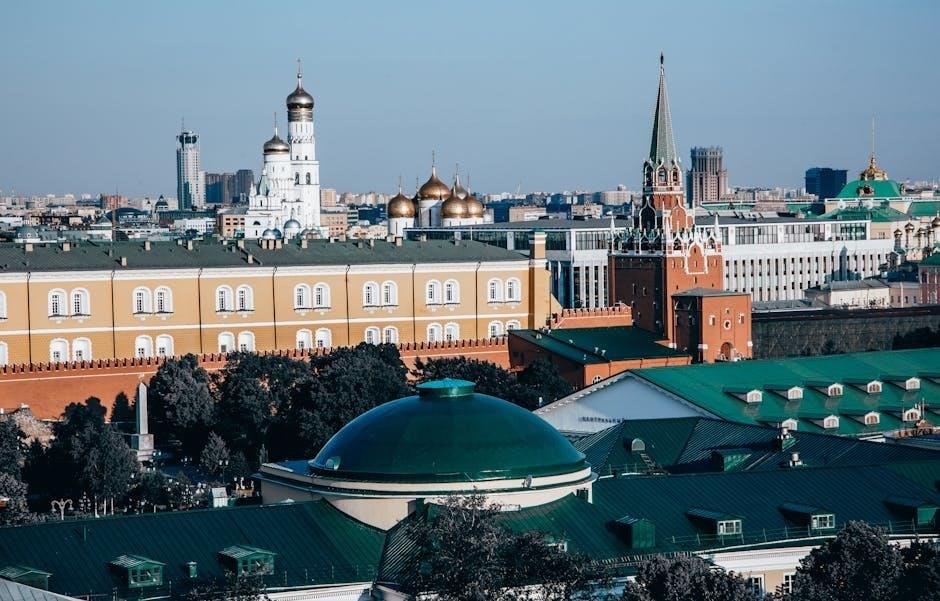Russia’s Mediterranean strategy reflects its broader geopolitical ambitions‚ aiming to counter Western influence‚ secure maritime access‚ and strengthen economic ties in the region.
Historical Context of Russia’s Interest in the Mediterranean
Russia’s interest in the Mediterranean dates back to the 18th century under Catherine the Great‚ driven by desires to expand maritime influence and secure access to warm-water ports. The Soviet Union later prioritized naval presence in the region‚ establishing a foothold in Syria during the Cold War. Post-1991‚ Russia’s resurgence under Vladimir Putin reignited Mediterranean ambitions‚ focusing on countering Western dominance and reinforcing strategic partnerships. This historical trajectory underscores Russia’s enduring quest for geopolitical relevance and access to critical trade and military routes in the region.
Key Objectives of Russia’s Presence in the Region
Russia’s primary objectives in the Mediterranean include ensuring maritime access through the Bosphorus and Dardanelles‚ projecting naval power‚ and supporting strategic allies. Economic interests‚ such as energy exports and infrastructure projects‚ also drive its engagement. Additionally‚ Russia seeks to counterbalance Western influence and promote its vision of a “Greater Mediterranean” encompassing the Black Sea‚ Caspian Basin‚ and Middle East. These goals align with Moscow’s broader strategy to assert itself as a global power and safeguard its geopolitical and economic interests in the region.

Geopolitical Importance of the Mediterranean for Russia
The Mediterranean is a strategic crossroads‚ offering Russia vital access to global trade routes and enabling it to project power while countering Western influence in the region.
Access to the Bosphorus and Dardanelles Straits
The Bosphorus and Dardanelles Straits are critical for Russia‚ connecting the Black Sea to the Mediterranean. These waterways enable Russian naval and commercial ships to transit between the Black Sea and the Mediterranean‚ ensuring access to global trade routes and military deployments. Control of these straits is vital for Russia’s maritime strategy‚ allowing it to project power and safeguard its interests in the region. Since 2014‚ Russia has intensified efforts to secure these routes‚ particularly after its annexation of Crimea and military intervention in Syria‚ reinforcing its geopolitical influence in the Mediterranean basin.
Russia’s Vision of the “Greater Mediterranean” Concept
Russia’s “Greater Mediterranean” concept expands the region’s scope‚ encompassing the Black Sea‚ Caspian Sea‚ and parts of the Middle East. This vision aims to integrate these areas into a unified geopolitical framework‚ enhancing Russia’s influence. By extending its strategic reach‚ Moscow seeks to counter Western dominance‚ secure energy export routes‚ and strengthen ties with regional allies. This broader definition allows Russia to project power beyond traditional boundaries‚ aligning with its goal of becoming a key player in global affairs and ensuring its presence in critical trade and security corridors.
Military and Naval Presence in the Mediterranean
Russia’s military presence in the Mediterranean is centered around its naval base in Tartous‚ Syria‚ and strategic operations to project power and counter Western influence.
Russia’s Naval Base in Tartous‚ Syria
Russia’s naval base in Tartous‚ Syria‚ established in 1971‚ serves as its sole permanent Mediterranean outpost‚ enabling strategic access for naval operations and support of regional allies. This facility has been critical for projecting power‚ ensuring maritime security‚ and safeguarding Russian interests in the Eastern Mediterranean. The base supports military operations‚ logistical supply chains‚ and intelligence gathering‚ while also bolstering Russia’s influence in the region. Its presence underscores Moscow’s commitment to maintaining a robust naval foothold‚ countering Western dominance‚ and securing economic interests in the Mediterranean.
Military Operations and Influence in the Eastern Mediterranean
Russia’s military operations in the Eastern Mediterranean‚ particularly its intervention in Syria since 2015‚ have significantly enhanced its regional influence. This involvement has allowed Moscow to project power‚ test advanced weaponry‚ and demonstrate its commitment to supporting allies. The deployment of naval and air forces has bolstered Russia’s ability to counter Western dominance and secure strategic access to vital trade routes. These operations have also strengthened Russia’s position as a key player in regional conflicts‚ ensuring its voice in shaping the Mediterranean’s geopolitical landscape.
Economic Interests and Energy Strategies
Russia’s economic interests in the Mediterranean focus on energy exports and infrastructure projects‚ strengthening partnerships with regional countries to expand its influence and secure resources.
Russian Energy Exports and Infrastructure Projects
Russia’s energy strategy in the Mediterranean revolves around exporting oil and gas to regional markets while developing infrastructure projects to enhance its economic presence. The construction of pipelines‚ such as the TurkStream‚ strengthens Russia’s role as a key energy supplier. These initiatives not only bolster Russia’s energy exports but also deepen its partnerships with Mediterranean nations‚ solidifying its influence in the region’s energy landscape and aligning with its broader geopolitical goals.
Partnerships with Mediterranean Countries
Russia has cultivated strategic partnerships with Mediterranean nations‚ particularly in the eastern Mediterranean‚ to expand its influence. These alliances focus on military‚ economic‚ and political cooperation. For instance‚ Russia has strengthened ties with Algeria‚ Syria‚ and Turkey‚ collaborating on hydrocarbon projects and military exercises. Such partnerships not only enhance Russia’s regional presence but also counterbalance Western influence‚ reinforcing its role as a key player in Mediterranean geopolitics and energy dynamics.

Political Influence and Alliances
Russia’s political influence in the Mediterranean is evident through strategic alliances and support for regional leaders‚ countering Western dominance and securing its geopolitical interests.
Russia’s Role in Regional Conflicts
Russia has significantly influenced regional conflicts in the Mediterranean‚ particularly through its military intervention in Syria since 2015. This involvement not only aimed to support Bashar al-Assad’s regime but also to expand Russia’s geopolitical reach. By establishing a naval base in Tartous‚ Syria‚ Russia bolstered its military presence‚ enabling it to project power across the Mediterranean. This strategy counters Western influence and underscores Russia’s ambition to become a key player in regional stability and conflict resolution‚ aligning with its broader objective of challenging American and European dominance in the area.
Soft Power and Diplomatic Efforts in the Mediterranean
Russia employs soft power and diplomacy to strengthen its influence in the Mediterranean‚ fostering cultural‚ economic‚ and political ties. Educational exchanges‚ language programs‚ and media outreach are key tools. Strategic partnerships with Algeria and Egypt highlight Russia’s efforts to build trust and cooperation. By promoting itself as a neutral mediator in regional conflicts‚ Russia aims to enhance its credibility and challenge Western dominance‚ thereby solidifying its position as a pivotal actor in Mediterranean geopolitics through non-military means.

Challenges and Rivalries
Russia faces challenges in the Mediterranean‚ including competition from Western powers and regional instability‚ while rivalries with NATO and energy competitors complicate its strategic goals.
Competition with Western Powers
Russia’s Mediterranean strategy faces significant competition from Western powers‚ particularly NATO members‚ who seek to maintain their dominance in the region. This rivalry extends to naval presence‚ energy exports‚ and political influence‚ with both sides vying for strategic advantages.
Russia’s actions‚ such as its intervention in Syria‚ have directly challenged Western interests‚ intensifying geopolitical tensions. This competition underscores Moscow’s efforts to counterbalance Western influence and assert its role as a global power in the Mediterranean.
Regional Security Concerns
Russia’s military activities in the Mediterranean have raised concerns among regional states‚ particularly regarding the potential destabilization of already volatile areas like Syria and Libya. Its naval presence and support for local regimes have heightened tensions‚ complicating efforts to achieve lasting peace;
The region’s security landscape is further strained by competing interests‚ with Russia’s actions often perceived as challenging existing power structures. This has led to increased vigilance from Mediterranean nations and their allies‚ wary of Moscow’s growing influence and its implications for regional stability.

Future Prospects and Implications
Russia’s Mediterranean strategy may expand its energy exports and political alliances‚ reshaping regional dynamics and enhancing its global influence in the coming decades.
Long-Term Strategic Goals
Russia aims to solidify its presence in the Mediterranean by countering Western dominance‚ ensuring energy export routes‚ and enhancing its naval capabilities. Moscow seeks to establish itself as a key regional player‚ leveraging its military and economic influence to secure long-term alliances. By maintaining a strong foothold in Syria and expanding partnerships‚ Russia intends to project power‚ safeguard its Black Sea access‚ and bolster its role in global energy markets‚ thereby reinforcing its position as a major geopolitical force in the Mediterranean.
Potential Shifts in the Regional Balance of Power
Russia’s growing influence in the Mediterranean could reshape the regional power dynamics‚ challenging Western dominance and creating a multipolar geopolitical landscape. By strengthening ties with key states like Algeria and Egypt‚ Moscow aims to expand its economic and military reach. This shift may weaken NATO’s traditional supremacy and alter security frameworks‚ potentially realigning alliances and creating new strategic realities in the region. Russia’s assertive posture could also inspire other regional actors to recalibrate their relationships with Western powers‚ further destabilizing the status quo.
